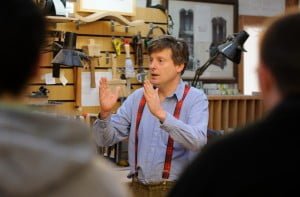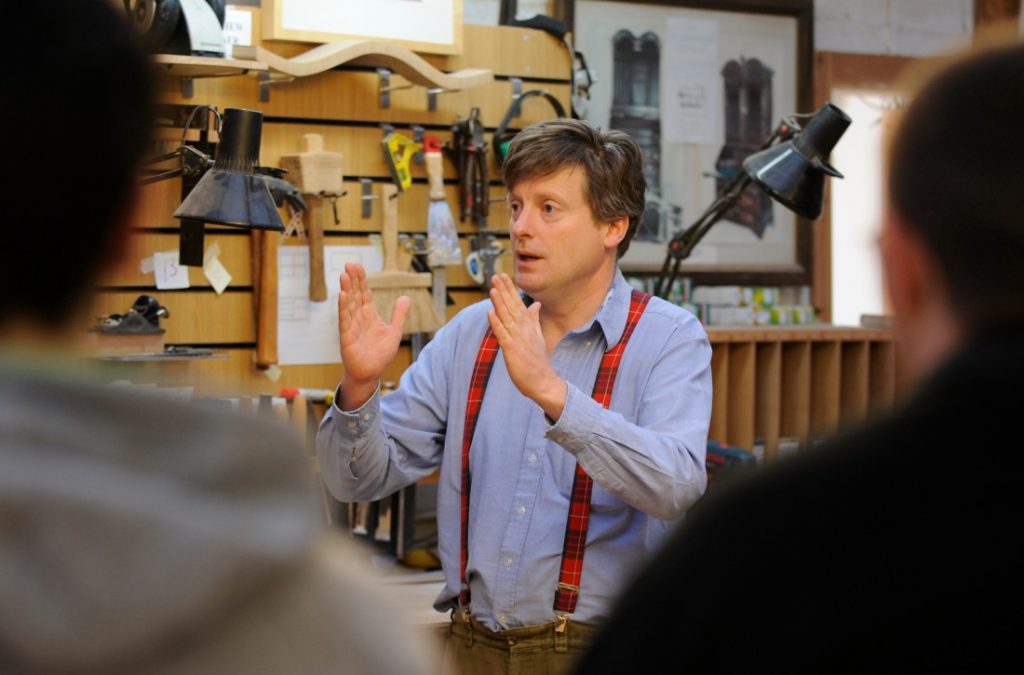Anselm Fraser, principal of the Chippendale School, offers some thoughts on the teaching process.
It’s said that early Puritan settlers in America would deliberately incorporate a mistake into their quilts, called a humility square, since perfection would be an affront to God.
It may well be a myth, but the same concept of random error crops up also in Navajo and Iroquois native American tradition – as well as in many European, Moslem and Asian cultures, including Persian rug makers and medieval scribes.

It may not, of course, be true because it’s impossible to knit or weave very complex carpets or quilts – let alone hand write and illuminate a religious text – without also making the occasional, unintentional mistake. Adding in a deliberate cock-up might seem a bit unnecessary.
But it’s a state of mind that woodworkers, particularly novice woodworkers, would do well to emulate. After all, while it’s all very well to aim for perfection, absolute perfection is rarely achieved – and usually only after a great deal of practice.
Anna Quindlen, the American author, expresses it perfectly. “The thing that is really hard, and really amazing, is giving up on being perfect and beginning the work of becoming yourself.”
At the Chippendale School, it’s a philosophy we’ve wholeheartedly adopted, because what we’re trying to do – certainly in the early weeks – is build confidence in our students: the confidence to explore their own creativity and, yes, make mistakes.
Mostly, of course, it’s simple recognition that we learn from our mistakes. The furniture that our students make in the final weeks of their course will be technically more proficient than their earlier pieces. Simple repetition of the basics inevitably makes them better woodworkers.
But it’s also about creativity and imagination, because what’s the point in holding back a student until they can demonstrate absolute perfection in measuring, glueing or sawing? The important thing is to learn the basics and, by practice, improve, improve and improve.
Forcing the novice woodworker to stay on the bottom rung until the basics are completely mastered is, for me, a sure way to deflate enthusiasm and curb imagination. What I want to instil is a sense of individual worth, not so much in their technical ability, but in their ambitions and artistic skills.
Because, for me, woodworking without artistry and creativity is nothing more than joinery. That’s not to disparage joiners and carpenters, but woodworking involves skills and aptitudes that that are greater than the sum of their parts – from understanding the properties of different woods, to imagining and making something of great beauty and complexity.
Other schools may take a different approach, arguing that you can’t run before you can walk; so better then to spend time and effort on being able to walk really, really well. It’s a step-by-step approach in which the student tortoise will eventually get there. But, while their mortise joints may be so perfect as to affront God, what greater skills will they have learned?
Rather, I teach my students how to run from day one, and then show them how to pick themselves up when they inevitably fall over. That way, I’m always pushing them to achieve more; more importantly, they’re also learning to push themselves, creatively and technically.
 For me, teaching has always been symbiotic. I take great pleasure in teaching our students and watching them forge woodworking careers; equally, even after thirty years as a teacher, I am forever learning from them – and being inspired by their imaginations and (sometimes wacky) creativity.
For me, teaching has always been symbiotic. I take great pleasure in teaching our students and watching them forge woodworking careers; equally, even after thirty years as a teacher, I am forever learning from them – and being inspired by their imaginations and (sometimes wacky) creativity.
In other words, I would rather foster imagination right from the start, because that’s what woodworking is all about – being inspired to make something and then working out how turn that idea into reality. Today, a table; tomorrow, a cathedral.
Okay, there may be a few wrong turns along the way, a few dead-ends, but mistakes are there to be learned from. After all, the woodworker who is frightened of making a mistake will rarely make anything of great merit.
The great statesman and orator Winston Churchill sums it up nicely. “They say that nobody is perfect. Then they tell you practice makes perfect. I wish they’d make up their minds.”
